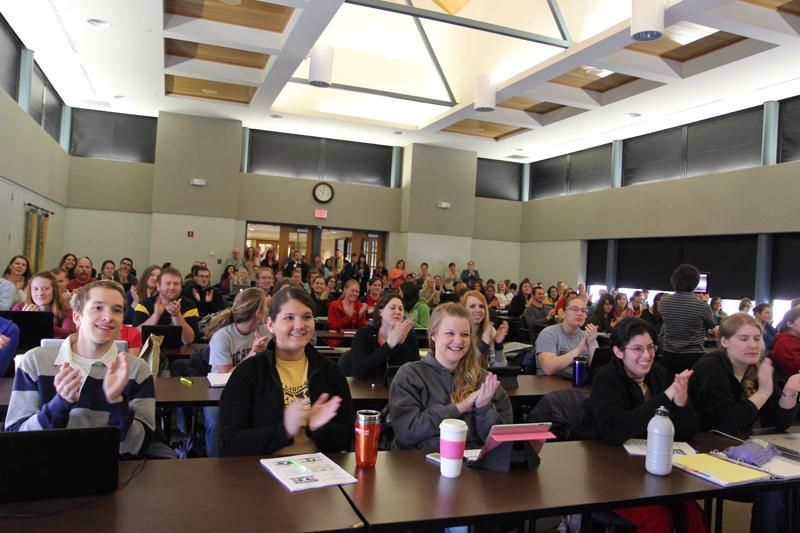
Elizabeth Baker was in the middle of teaching a group of doctoral students when she was announced as one of the five recipients of this year’s Kemper Fellowship for Teaching Excellence.
“I have a Tuesday night class and I saw a group coming in,” said Baker, a literacy professor in the College of Education. “I thought it was a group of people who didn’t know that room had been taken and were trying to have a meeting, so I was going to go outside and dismiss them. Fortunately I didn’t do that, or I would have totally embarrassed myself.”
The Kemper Fellowship, named after Kansas City civic leader William Kemper, was established in 1991, two years after the former Commerce Bank president’s death.
MU Deputy Chancellor Michael Middleton, Commerce Bank Chairman Jim Schatz and other MU faculty and staff entered Baker’s classroom and presented the award to her in front of her class. Although the Kemper Fellowship comes with a $10,000 check, Baker said the main aspect of the award is the recognition.
William Horner, an associate teaching professor in the Department of Political Science, and Cheryl Black, associate professor in the Department of Theatre, were also recognized with the award.
“We had reached the end of class and I was about ready to wrap up,” said Horner. “I was going to let class out 15 minutes early and they came just in time. That would have been embarrassing to not be there.”
Horner said he knew he was nominated but winning was still a surprise.
“I have no idea how many people get nominated, but my guess is it’s a lot, so I did not expect they were going to come through my door,” said Horner. “My students seemed enthusiastic, which was a relief.”
Both Baker and Horner have taught at MU for more than a decade. Before accepting the job in political science, Horner taught at Lake Superior State University for a year.
Baker taught a slightly younger crowd.
“I taught second grade in South Carolina at a school in the bottom 8 to 10 percent of schools in the country,” Baker said. “There were usually five to eight students a year who couldn’t write their own names. And most of those had already repeated a year. There was a wonderful girl who couldn’t read or write her own name when she came to me but by Thanksgiving, she was able to bring a book and read in front of the whole class dramatically.”
Baker chose to become a university professor after being influenced by her own educators, she said. When it came down to deciding to teach 30 students a year or college students who would go on to each teach 30 students themselves, she chose to educate educators.
Baker said that her fellow faculty members in the College of Education are excelling in the field as well.
“I’m surrounded by excellent educators, you know,” she said. “No man’s an island.”